In couples who spend a lot, money disputes can affect even the happiest relationships. While typical advice includes budgeting and talking openly, there are advanced methods to organize family finances. These strategies create a flexible structure that encourages understanding and teamwork.
Establishing a Family Financial Council
Couples with high net worth can gain significant advantages by establishing a formal Family Financial Council. This council, which includes both partners and may also consist of financial advisors or knowledgeable family members, meets regularly to explore long-term financial objectives, investment plans, and important spending choices. For example, when thinking about buying a luxury vacation home or engaging in a risky, high-return investment, various financial aspects are assessed by the council. By including all key members in an organized decision-making process, the council helps minimize rash choices and related conflicts. Additionally, it can implement a system to monitor financial progress, ensuring that both partners remain on the same page regarding the family's financial path.

Segmenting Financial Responsibilities
Instead of equally sharing all financial duties, assign tasks according to each partner’s skills and preferences. For instance, one partner may manage investments, using their expertise in the stock market, private equity, or real estate. Meanwhile, the other partner can handle everyday financial matters like paying bills, managing family trusts, and tracking luxury expenses. By establishing clear roles, confusion is minimized, and it helps ensure that no partner feels neglected or overloaded with financial choices. To improve this arrangement even more, set up a shared online platform where both partners can view financial information instantly, encouraging openness and responsibility.

Implementing a Financial Emergency Protocol
Families with high spending habits are not protected from financial crises. Unexpected challenges can arise, such as a business loss, serious health problems, or a decline in the economy. It’s essential to create a clear plan for financial emergencies. This plan should specify how to access available emergency funds, which assets to sell first if necessary, and who has the authority to make critical decisions during tough times. For instance, a family may choose to keep a portion of their wealth in easily accessible assets, like cash or short-term bonds, for quick use in emergencies. Having a strategy in place helps couples remain calm and prevents arguments in stressful moments, ensuring the family's financial security is upheld.
Incorporating Financial Goals into a Family Constitution
A Family Constitution serves as an effective instrument for affluent families. It outlines the family's core values and future aspirations while integrating their financial objectives. This document may set forth principles regarding inheritance, philanthropy regulations, and the financial education of family members. For example, it could specify that a certain percentage of the family's assets should be dedicated annually to enhance educational programs for disadvantaged communities. Establishing these financial guidelines within a constitution ensures that all family members are aligned with shared goals, which lessens the likelihood of disagreements over wealth distribution, spending choices, or financial strategies moving forward.

Regular Financial Retreats and Reviews
Plan annual or biannual financial retreats for couples to step back from their everyday lives and concentrate on managing their family finances together. These retreats can take place in a soothing, upscale environment that encourages honest and thorough conversations. During these gatherings, couples can evaluate their family’s financial performance from the past period, reconsider their financial goals based on any new developments, and look into fresh investment options or financial tactics. Additionally, these retreats create a space for couples to share their financial worries and hopes, which can enhance their financial collaboration and make certain that their financial approaches adapt to their family's evolving needs and lifestyle.
In summary, high-spending couples can achieve financial harmony by formalizing their approach to managing family finances. By forming a financial committee, clarifying individual roles, setting up emergency protocols, drafting a family constitution, and conducting regular assessments, couples can establish a robust financial groundwork that not only minimizes disputes but also lays the foundation for sustainable financial success and family well-being.

Impact of Dollar Strength

Crafting Your Wealth Blueprint

Education Savings: A Parent's Guide to Early Planning

Crowdfunding Projects in the Metaverse: How Creators Are Raising Capital

Crafting Wealth: Assets for High - Earners

How Startups are Using Crowdfunding to Build Growth

Beyond Profit: Judging a Side Hustle’s True Worth
